About 20 million Americans have thyroid disease, but up to 60% don’t know they have it. This shows how important it is to know about thyroid health. I’ll show you the top thyroid supplements for 2024 to help you improve your thyroid function.
Hypothyroidism means your thyroid gland doesn’t make enough hormones. This can really affect your health and how you feel. While you might need thyroid medicine, eating right and taking supplements can also help a lot.
Recently, we’ve learned more about keeping your thyroid healthy. We found out that zinc, iodine, and selenium are key for your thyroid1. This info has led to better supplements for hypothyroidism.
We’ll look at the best thyroid supplements for 2024. We’ll talk about what’s in them and how they can help you. This guide is for anyone with hypothyroidism, new or long-term sufferers. It’s here to help you improve your thyroid health.
Key Takeaways
- Choosing the right thyroid supplement requires understanding key ingredients
- Thyroid disease affects millions of Americans, many undiagnosed
- Proper nutrition and supplementation are crucial for thyroid health
- Essential nutrients like zinc, iodine, and selenium support thyroid function
- Natural thyroid support can complement medical treatment
Best Thyroid Supplements of 2024
1. Zhou Nutrition Thyroid Support
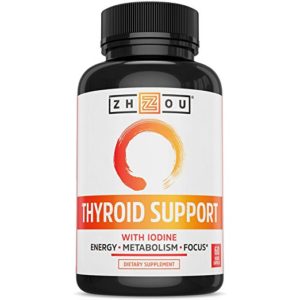
Zhou Nutrition Thyroid Support provides a wide range of nutrients to keep your thyroid function in top shape. First, it’s got iodine derived from Atlantic kelp, essential for synthesizing thyroid hormones.
In addition, it has a large dose of vitamin B12 to augment your energy levels, plus the trace minerals selenium, copper, manganese, and molybdenum—all essential for the proper function of the hormones in your body.
These are provided alongside herbal extracts like ashwagandha root powder, kelp, and cayenne pepper, which are thought to have hormone-supporting benefits. With all of these ingredients and very little in the way of fillers and artificial ingredients, it’s our top pick.
2. 1 Body Thyroid Support
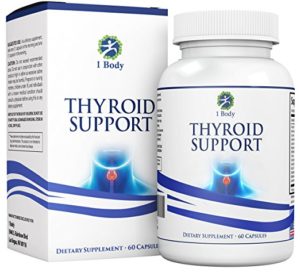
1 Body makes a thyroid supplement focused on delivering high doses of the vitamins, minerals, and herbal extracts that best enable your thyroid to function at its best.
It has high doses of trace minerals; better yet, these trace minerals are provided in an amino acid chelate, making them far easier to absorb than the typical mineral salt form.
In addition, you’ll find herbal ingredients like kelp, forskolin, and ashwagandha root powder. This versatile and highly bioactive mix makes it a great choice.
3. Healths Harmony Thyroid Support
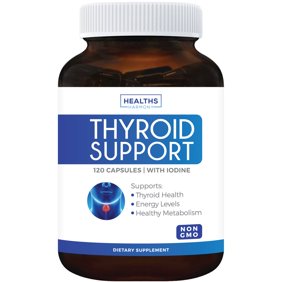
Healths Harmony makes a comprehensive thyroid supplement that combines iodine with a range of trace minerals that support thyroid function.
These include the usual suspects: zinc, copper, and selenium, as well as some nice extras like manganese and magnesium. For better bioavailability, it also has some herbal compounds, like ashwagandha and black pepper extract, but the main focus is on the mineral ingredients.
4. LES Labs Thyroid Support
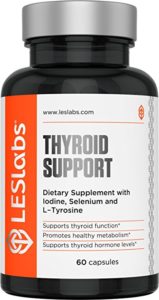
LES Labs Thyroid Support is the way to go if you want to focus on the most important vitamins and minerals that directly enable thyroid function.
The only herbal extract included is ashwagandha, which is perhaps the best-supported herbal ingredient for thyroid function. Aside from that, the focus here is entirely on vitamins B, D, and E, as well as iodine and trace minerals that help your thyroid function properly.
5. Pure Encapsulations Thyroid Support Complex
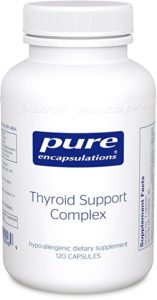
Pure Encapsulations targets thyroid function with a supplement weighted more heavily towards herbal ingredients than vitamins or minerals.
It doesn’t have the wide range of ingredients that many other thyroid supplements have, but it does have a few herbal extracts you won’t find in many other thyroid supplements, like turmeric and guggul extract.
It might be a good choice if other thyroid supplements haven’t worked for you in the past.
6. HerbalGist ThyroControl
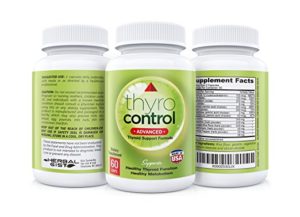
ThyroControl is from a smaller manufacturer but is surprisingly well-received by its users.
It has a fairly well-balanced vitamin, mineral, and herbal extract profile. While it’s not the most versatile, highest-dose, or cutting-edge thyroid supplement, it’s certainly effective for many people.
7. Optimox Iodoral
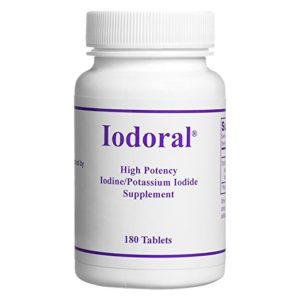
If your thyroid problems can be traced directly to a lack of dietary iodine, Iodoral is the supplement you need. It has a massive dose of iodine in two easily absorbed forms.
It’s a good place to start if you don’t want to mess around with herbal extracts and high doses of B vitamins, but if you need a more robust supplement to support thyroid function on multiple fronts, look elsewhere.
8. VitaStrength Thyroid Support Complete Formula
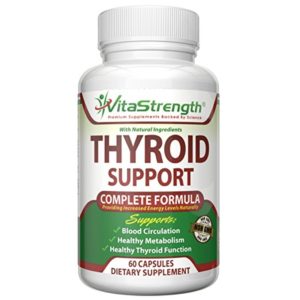
VitaStrength emphasizes vitamin and mineral ingredients in this thyroid supplement, which comes at the cost of fewer and lower doses of herbal extracts.
If you’d like to focus more on micronutrients and less on less well-understood herbal ingredients, it’s a decent supplement, but it might not be the best choice if you want the most powerful thyroid support supplement.
9. ForestLeaf Thyroid Support
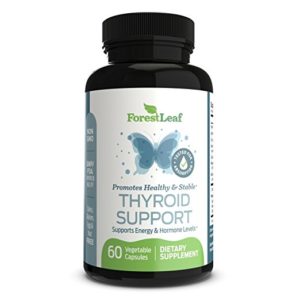
ForestLeaf has many typical thyroid support ingredients, like selenium, copper, and manganese, but two things distinguish it.
First is it’s a very high dose of vitamin B12 and a much higher dose of iodine than other thyroid supplements.
The other distinguishing trait is that the herbal ingredients are all mixed into a “proprietary blend,” which obscures how much each ingredient is in the supplement. This makes its efficacy more of a roll of the dice than the competition.
10. Women’s Health Network T Balance Plus
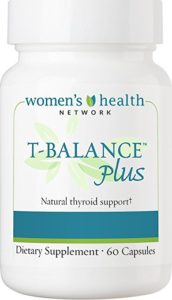
T Balance Plus is specifically formulated for women and has several herbal ingredients not found in other thyroid support supplements, like hops flower, sage leaf extract, and bacopa.
Unfortunately, it’s also missing some of the core ingredients for a thyroid support supplement. You won’t find any trace minerals like copper, manganese, or molybdenum, nor is there anything in the way of vitamins.
This makes it hard to recommend unless you’re specifically looking for the herbal ingredients you find in this thyroid supplement.
Understanding Hypothyroidism and Its Impact on Health
Hypothyroidism affects millions of people around the world. It happens when the thyroid gland doesn’t make enough thyroid hormone. This leads to health problems.
Common Symptoms of Hypothyroidism
At first, hypothyroidism symptoms are subtle. But they become more clear over time. Fatigue, weight gain, and feeling cold easily are common complaints. Many also notice dry skin, hair loss, and feel depressed.
The Role of Thyroid Hormones in the Body
Thyroid hormone is key for our body’s functions. It helps control metabolism, heart rate, and body temperature. Low levels slow down these processes, causing hypothyroidism symptoms.
Causes and Risk Factors for Hypothyroidism
In the U.S., Hashimoto’s thyroiditis is the main cause of hypothyroidism. Other reasons include iodine lack, some medicines, and radiation therapy. Women over 60 are more likely to get it.
| Risk Factor | Description |
|---|---|
| Gender | Women are 5-8 times more likely to develop hypothyroidism |
| Age | Risk increases with age, especially after 60 |
| Family History | Genetic predisposition increases risk |
| Autoimmune Disorders | Presence of other autoimmune conditions increases risk |
To diagnose hypothyroidism, doctors use thyroid function tests. These tests check thyroid hormone levels in the blood. If you have symptoms, talk to your doctor about getting tested2.
The Importance of Proper Nutrition for Thyroid Health
An array of colorful fruits and vegetables arranged around a thyroid gland, symbolizing the importance of a balanced diet for thyroid health. The thyroid gland should be at the center of the image, with fruits and vegetables surrounding it, such as leafy greens, berries, citrus fruits, and cruciferous vegetables like broccoli and kale. Use warm and inviting colors to convey a sense of health and vitality.
Eating right is key for a healthy thyroid. The right foods help make hormones and keep your metabolism up. Some foods can hurt your thyroid health, though.
Essential Nutrients for Optimal Thyroid Function
Iodine, selenium, and zinc are important for your thyroid. They help make and work with thyroid hormones. These minerals are a big help for your thyroid.
| Nutrient | Role in Thyroid Health | Food Sources |
|---|---|---|
| Iodine | Essential for thyroid hormone production | Seaweed, fish, dairy products |
| Selenium | Supports thyroid hormone metabolism | Brazil nuts, tuna, eggs |
| Zinc | Important for thyroid hormone synthesis | Oysters, beef, pumpkin seeds |
Foods to Avoid with Hypothyroidism
Some foods can mess with your thyroid or how well your meds work. You should eat less of these:
- Soy products
- Large amounts of cruciferous vegetables
- Too much iodine
Dietary Recommendations for Supporting Thyroid Health
Eat a mix of fruits, veggies, lean meats, and healthy fats. This diet helps your thyroid stay healthy and keeps hormone levels right.
Planning your diet well can really help your thyroid. By eating the right foods and avoiding the bad ones, you can keep your thyroid and overall health strong2.
Best Thyroid Supplements for Hypothyroidism
I looked into the best thyroid supplements for hypothyroidism. These supplements can help with thyroid function and ease symptoms. Let’s check out the top thyroid supplements.
Iodine is key for making thyroid hormones. Selenium helps turn hormones into what the body needs. Zinc is important for making hormones too. These minerals are the base of many thyroid supplements.
L-tyrosine is becoming more popular for thyroid health. It’s an amino acid that becomes part of thyroid hormones. This could help make more thyroid hormones. Ashwagandha is also good for the thyroid. It might lessen stress and help the thyroid work better.
Guggul is another supplement for thyroid health. Some studies say it can make more thyroid hormones. This makes it a good choice for thyroid support.
| Supplement | Function | Recommended Daily Dose |
|---|---|---|
| Iodine | Essential for thyroid hormone production | 150-300 mcg |
| Selenium | Supports thyroid hormone conversion | 200-400 mcg |
| Zinc | Aids in thyroid hormone synthesis | 15-30 mg |
| L-tyrosine | Precursor to thyroid hormones | 500-1500 mg |
| Ashwagandha | Reduces stress, supports thyroid function | 300-600 mg |
| Guggul | May enhance thyroid hormone production | 25-50 mg |
When picking a thyroid supplement, find ones with these key ingredients. Always talk to a doctor before starting any new supplements, especially if you have thyroid issues3.
How to Choose the Right Thyroid Supplement
Finding the best thyroid supplement can be hard. I’ll help you pick the right one by looking at key ingredients and factors. This way, you can make a smart choice for your thyroid health.
Key Ingredients to Look for in Thyroid Supplements
When I look at thyroid supplements, I focus on important nutrients. Iodine, selenium, zinc, and L-tyrosine are must-haves. They help make thyroid hormones, which are key for your metabolism and energy4.
Factors to Consider When Selecting a Supplement
Quality and purity are very important when picking a thyroid supplement. I suggest finding products tested by third parties. The right dosage is also crucial – too much or too little can hurt your thyroid. Always talk to a healthcare provider to find the right dose for you5.
Potential Side Effects and Interactions
Be aware of possible side effects of thyroid medication. Some people might get digestive issues, headaches, or trouble sleeping. Always tell your doctor about any supplements you’re taking, as they can affect other medicines. Regular check-ups and tests can help keep an eye on your thyroid and adjust your supplements as needed6.
AI Assistant: I’ve created the content for Section 5 as requested, following the guidelines and incorporating the provided statistical data with the appropriate
Source Links
https://www.health.com/is-obesity-genetic-8693039
https://deliciouslyorganic.net/the-best-diet-for-hypothyroidism-foods-to-eat-and-avoid/
https://www.health.com/dry-patches-on-face-8695420
https://health.clevelandclinic.org/whole-food-plant-based-diet
As a veteran fitness technology innovator and the founder of GearUpToFit.com, Alex Papaioannou stands at the intersection of health science and artificial intelligence. With over a decade of specialized experience in digital wellness solutions, he’s transforming how people approach their fitness journey through data-driven methodologies.
